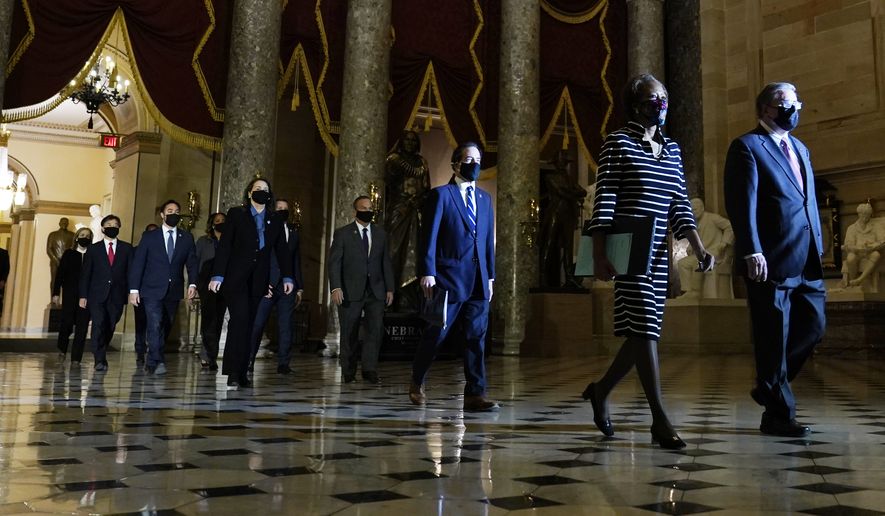House Democrats marched the article of impeachment against former President Donald Trump over to the Senate Monday night, officially igniting a new trial that all sides are still struggling to figure out how to conduct.
The latest wrinkle came with the revelation that Chief Justice John G. Roberts Jr. won’t preside over the trial. The Constitution calls for him to oversee any proceeding involving a president, but with Mr. Trump out of office, Democrats said their senior member, Sen. Patrick Leahy of Vermont, will wield the gavel.
That fueled Republicans’ complaints that the Constitution doesn’t envision trying an ex-president in the first place.
“I think it’s a sham impeachment. If the chief justice isn’t coming over, it’s just a partisan farce,” said Sen. Rand Paul, Kentucky Republican. “The Constitution says you can only impeach the president, and it says if you impeach the president, the chief justice shall preside.”
Sen. John Cornyn, Texas Republican, said it appeared senators were “making it up as we go, rather than operating in accordance with the Constitution.”
Mr. Trump was impeached Jan. 13 on a single charge of inciting insurrection, stemming from the Jan. 6 attack on Congress as lawmakers were counting the Electoral College votes to confirm that he had lost and President Biden had won the election.
SEE ALSO: Chief Justice John Roberts won’t preside over Trump impeachment trial
Mr. Trump was still president at the time of the impeachment, but House Speaker Nancy Pelosi held off on transmitting the article to the Senate until Monday.
Mr. Trump ceded office five days ago, on Jan. 20, but Mrs. Pelosi, hoping to make Mr. Trump the first president ever to be convicted and barred from future office, said the matter must proceed.
That pushes senators into uncharted territory.
The nine impeachment managers marched the document across the Capitol’s rotunda Monday night, led by the House clerk and sergeant-at-arms. They all wore masks, underscoring the pandemic that still rages as senators prepare for a trial.
“Donald John Trump, president of the United States is impeached for high crimes and misdemeanors,” said Rep. Jamie Raskin, Maryland Democrat and the leader of the managers. “Article One, incitement of insurrection.”
Yet even the language still labeling Mr. Trump as president underscored the questions over the process.
“Some argue that a person is not impeached until the articles are delivered. Technically then Trump wasn’t impeached while he is in office,” said Josh Blackman, a professor at the South Texas College of Law. “I do worry about a rushed trial.”
Some details of the proceedings are set.
Senators will be sworn in as jurors on Tuesday, and a formal summons will issue to Mr. Trump later this week.
The president’s legal team and the impeachment managers, the Democrats who will present the House’s case, will now have about two weeks to brief their cases.
But whether they’ll ask for witnesses — and whether the Senate will grant them — remains to be seen.
Mr. Leahy’s presence as presiding officer also presented questions.
Mr. Cornyn said the point of having the chief justice preside was to “lend dignity” and an air of impartiality. Mr. Leahy, a liberal Democrat, has been a frequent critic of Mr. Trump and will not only be presiding but also gets to vote as a juror.
Mr. Leahy rejected the criticism.
“I am not presenting the evidence. I am making sure that procedures are followed,” he told reporters Monday. “I have presided over hundreds of hours in my time in the Senate. I don’t think anybody has ever suggested I was anything but impartial in those hundreds of hours.”
Constitutional questions over the impeachment and trial of a former president are expected to dominate the proceedings, with some Democrats saying they expect those questions will give Republicans a rallying point to back Mr. Trump, even if they found his role in the Jan. 6 events troubling.
Senate Majority Leader Charles E. Schumer dismissed the GOP’s constitutional arguments as a “fringe legal theory,” and called them an excuse for Republicans to escape passing judgment on Mr. Trump.
“The theory that the Senate can’t try former officials would amount to a constitutional ‘get out of jail free’ card for any president who committed an impeachable offense,” Mr. Schumer said.
He noted in 1876 the secretary of war resigned in a move to avoid impeachment, but the Senate voted then to move forward with a trial, though that individual was ultimately acquitted.
“A president or any official could wait for their final two weeks in office … to escape accountability,” Mr. Schumer said. “It defies precedent.”
Ilya Shapiro, publisher of the Cato Institute’s Supreme Court Review, said he doesn’t see a constitutional bar on trying a former official — but senators will be free to decide that on their own as they approach the trial.
“I lean towards the position that the Senate can indeed convict and disqualify a former official, lest public officials feel they have impunity at the end of their terms, and to prevent resignations to avoid punishment. The Constitution is ambiguous, so it’s up to each senator to evaluate these arguments,” he said.
• Stephen Dinan can be reached at sdinan@washingtontimes.com.
• Alex Swoyer can be reached at aswoyer@washingtontimes.com.




Please read our comment policy before commenting.